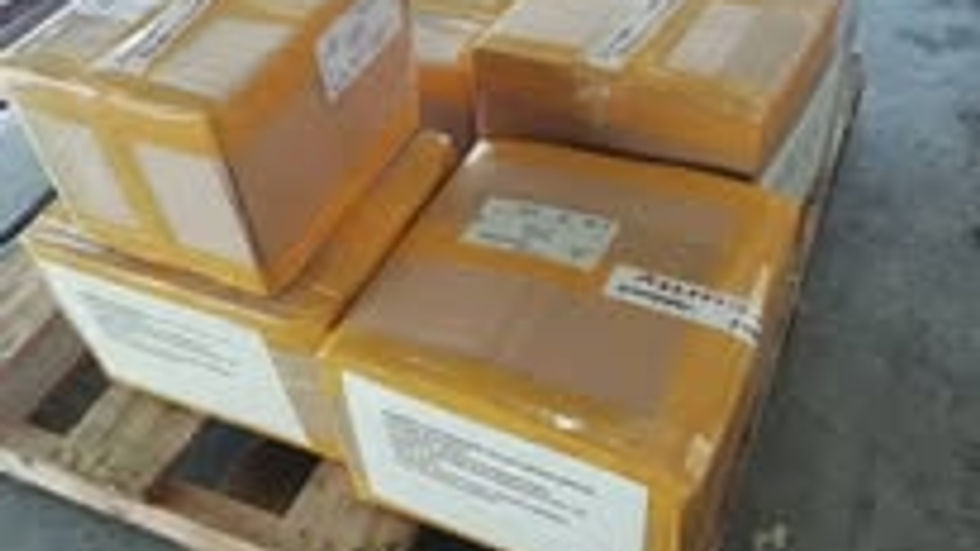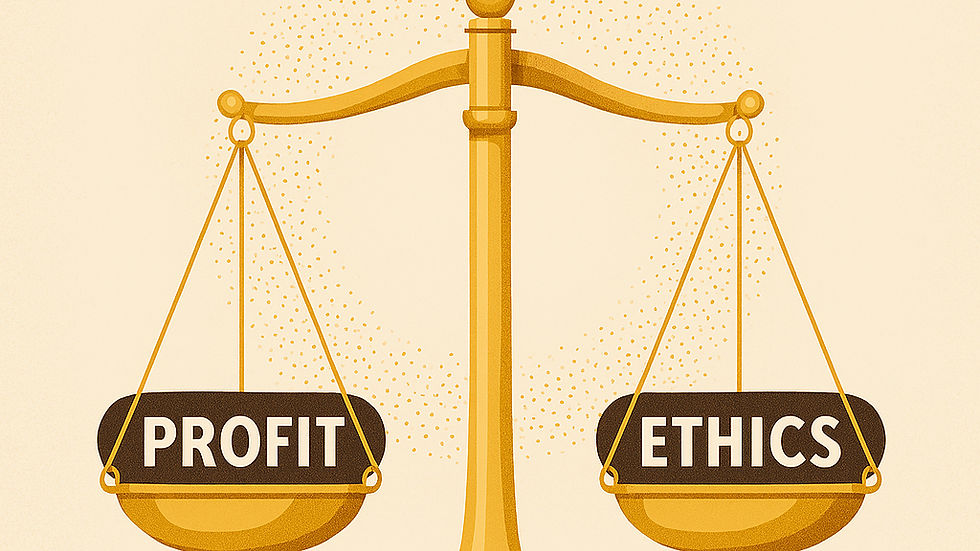The Inspiring Journey of OTI: From Idea to Reality
- Nov 10, 2025
- 6 min read
Updated: Dec 27, 2025
How It All Began (2015–2016)
In 2015, I was still an employee at a multinational aviation ground handling company in Ghana. My life revolved around my full-time job, and I had no clear plan for starting a new side business in commodities. I was content managing an online business I had set up in 2009. Then, one day, a client from Egypt posted an inquiry on an international platform about shea butter, griffonia, and natural cocoa butter.
At that moment, I knew very little about these commodities. Shea butter was something I vaguely remembered from childhood—my mother used to apply it on me and my sisters when we lived in Africa. Cocoa butter? I thought cocoa only meant chocolate. And griffonia? I had never heard of it.
But instead of bowing out, I decided to learn. I researched, educated myself, and with very little knowledge but strong dedication to promote products from my native country, I replied confidently: “Yes, we can.”
At that time, OTI did not exist. I was the only one on the “team,” if a team there was.
First Steps into Trade
The client quickly followed up, asking about pricing, MoQ (Minimum Order Quantity), and FFA (Free Fatty Acid levels). At that time, these terms were completely foreign to me. They sounded like strange codes from another world. Honestly, when I first read them, I was like: “WHAT??”
I had already confirmed to the client that "WE" could supply, so admitting ignorance at that point would have made me look unprofessional; a 'clown' to say the least. I couldn’t afford to lose credibility. Instead, I quietly turned to Google. I typed in “MoQ in production” and discovered that it referred to the minimum order quantity a supplier is willing to accept. That was a relief—I finally had something to work with. I decided to propose 50kg as our starting MoQ, knowing it was modest but realistic for a new venture.
As for FFA, I had no idea what it meant. Again, I searched online and learned that Free Fatty Acid levels were a measure of product quality, especially in oils and fats like cocoa butter and shea butter. To buy myself some time, I told the client I would compile the information and get back to him. Behind the scenes, I was juggling my full-time job while racing to educate myself on these technical requirements.

During lunch breaks, I interviewed suppliers, requested specification sheets, and gathered details on pricing, payment terms, and product standards. Out of ten suppliers I contacted, only two proved serious and reliable. They shared their specifications and agreed to provide samples. With this information, I created detailed product profiles for each commodity, carefully compiling everything the client had requested.
All communication happened on Skype back then.
When I finally sent the documents, the client was pleased. That moment taught me something invaluable: even when you start from a place of ignorance, persistence and resourcefulness can turn confusion into competence.
Ignorance is not the end; it’s the beginning of learning.
The First Shipment & Payment
When the client requested samples, he was very clear: no DHL. He had already suffered a bad experience with that service provider and wanted a cheaper, more reliable option. At that time, the only viable solution was EMS Ghana Post, which was both affordable and secure from the client’s perspective. I had no choice but to chase quotations from EMS, following up relentlessly until I finally secured one.
The payment itself was another story. It couldn’t be sent to OTI—because OTI didn’t even exist yet. I had no idea that a few years later, I would establish a company by that name. Back then, the money—about 690 GHS—was wired through Western Union directly to me, as an individual, and I carried the responsibility of making sure everything was done right.
I remember skipping lunch, rushing in a taxi to EMS, clutching the receipt like it was gold. For two weeks, I barely slept, haunted by nightmares that the samples might never arrive. Finally, in December 2015, the client confirmed receipt. He was satisfied and placed his first order: 200kg of unrefined shea butter.

That moment was overwhelming. I was filled with joy—my first international order had been shipped successfully. But not everyone shared my excitement. My Ghanaian colleagues laughed at me, mocking my enthusiasm for shea butter. To them, it was an inferior, rustic product—something unworthy of serious business. Their ignorance and disdain for what God had blessed Ghana with only fueled my determination. If they couldn’t see the value, I would. Their repugnance became my motivation to push harder, to prove that our natural products deserved global recognition.
That first shipment was more than a transaction—it was the spark that ignited OTI’s journey.
Sometimes the world laughs at your vision, but that’s the sign you’re onto something big.
Learning the Trade
That first order was more than just a transaction—it was my classroom. I discovered that international trade required specific shipping documents:
Certificate of Origin
Certificate of Analysis
Phytosanitary Certificate
At the time, these were new to me, but I leaned on suppliers and freight forwarders to guide me. I was determined to learn quickly, to become independent, and to ensure my client’s confidence was never misplaced.
When the shipment was finally successful and the client praised the transparency and quality, I felt an immense sense of pride. It seemed to me that I was achieving my deeper goal: promoting Ghana’s heritage through trade. What had started as curiosity was now becoming a mission.
I realized that in serious business, partnership, trust, and communication are currencies no one can afford to omit. They are as valuable as money itself, because without them, trade collapses. This lesson became a cornerstone of how I approached every future deal—with ethics, transparency, and respect.
The client’s satisfaction was proof that Ghana’s natural products could stand tall on the global stage. Within months, the order grew to 500kg, and by November 2016, it reached 1,000kg (1 metric ton). Each increase was not just about volume—it was about validation. It was evidence that persistence, learning, and integrity could transform a small beginning into a growing enterprise.
Every shipment was more than business; it was a step toward rewriting the narrative of Ghanaian trade.
The First Major Setback
Just when I thought progress was steady, disaster struck. In December 2016, while on holiday in Akosombo with my sisters, I received a WhatsApp message from the client. The photos and videos he shared broke me: the shea butter shipment was infested with insects, its once-ivory color had turned orange and dark in places.
I was devastated. I felt let down, ashamed, and deeply troubled. Coming from a family where we do not take advantage of people, this cut me to the core. Our values have always been about remaining ethical, professional, and protecting our reputation. To see a client suffer because of a supplier’s negligence was unbearable. I felt cheated—not just financially, but morally.
The supplier refused responsibility, hiding behind the argument that the goods were supplied on an ex-works basis. His unprofessional behavior was shocking. For me, this was not just a business setback—it was a violation of trust. I had promised the client transparency and quality, and now my integrity was on the line.

In that moment, my prime goal became clear: to stand up for what was right and to protect the interest of the client. I realized that accountability, quality assurance, and risk management were not optional—they were the pillars of serious trade.
Yes, I was deeply affected, but I was not ready to give up. This painful experience became a turning point. It was the moment I understood that OTI’s journey would not only be about selling products—it would be about building a reputation rooted in ethics, professionalism, and trust.
This was only the beginning of the OTI journey.
Integrity is tested in the fire of setbacks, and that test shaped the DNA of OTI.
The Road Ahead
In the next edition, we will share how Esthy navigated this setback, rebuilt trust, and laid the foundation for OTI as a company—not just a side hustle. This is only the beginning of a story about resilience, ethics, and determination in Ghanaian trade.
Join the OTI Journey—real stories, real lessons, straight to your inbox.
If you’ve been inspired by this chapter, don’t miss the next one. Subscribe to our newsletter to follow the full journey of OTI and discover lessons that can motivate your own entrepreneurial path.
































































Comments